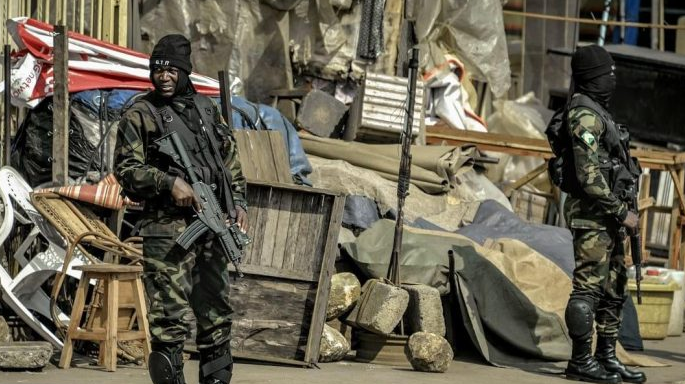Monday 1 October marked the one-year anniversary of the declaration of independence by anglophone separatists in the southwest of Cameroon, when they announced the birth of a new nation: Ambazonia. That declaration of independence provoked a brutal clampdown by the Cameroonian government, leading to hundreds of civilians and dozens of members of the security forces being killed over the past year.
In the build-up to the anniversary, Adolphe Lele Lafrique, governor of the largely English-speaking northwest region, announced a curfew, stating that: “The movement of people between areas in the northwest is banned for a period of 48 hours from Sunday, 30 September until Monday, 1 October.” Similar measures were in force across Cameroon’s other anglophone areas.
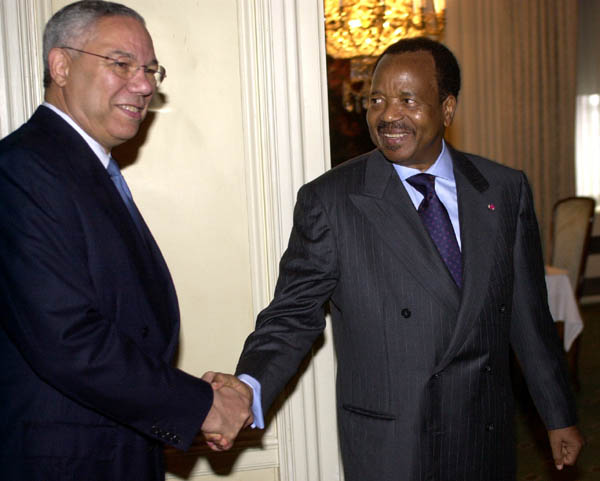 President Biya responded to the declaration of Ambazonia and the subsequent anglophone insurgency with repression, which was met in turn with bloody attacks by separatists / Image: US Dept of State
President Biya responded to the declaration of Ambazonia and the subsequent anglophone insurgency with repression, which was met in turn with bloody attacks by separatists / Image: US Dept of State
In Buea, a town in the southwest that has been at the heart of the anglophone insurgency, officials also announced a raft of “special security measures”. All shops and bars were closed, cultural and sporting events cancelled and public and private transport suspended throughout Sunday and Monday. The two-day curfew also affected the southwestern coastal towns of Limbe and Tiko.
This came a week ahead of polls opening for Cameroon’s presidential elections on 7 October, a vote that anglophone secessionists vowed to disrupt. 85-year-old, Francophone incumbent Paul Biya is seeking a seventh term, having already been in power since 1982, amidst rampant corruption and brutal repression of the anglophone minority (which represents approximately 20 percent of the Cameroonian population). However, opposition leader Maurice Kamto has already declared himself the winner ahead of the official results (not uncommon in African nations), in an election that has seen an extremely low turnout in anglophone areas.
Last year’s independence declaration triggered a crisis that has cast a shadow over the current elections, with tit-for-tat skirmishes between the security forces and anglophone separatists. Cameroon’s two English-speaking regions — the North-West and Southwest — have seen almost daily violence that has left at least 400 dead in the past year.
Biya responded to the declaration of Ambazonia and the subsequent anglophone insurgency with repression, which was met in turn with bloody attacks by separatists, who have killed troops and police and torched schools and other symbols of the Cameroonian state. Six civilians and two police officers were killed in Cameroon’s English-speaking southwest, and two police officers were allegedly killed and a policewoman injured on the outskirts of the beach resort town of Limbe. Meanwhile, in Buea, the capital of the southwest region, police shot dead six civilians and injured another. Soldiers and separatists also traded gunfire in Bamenda, the main city in the anglophone northwest region.
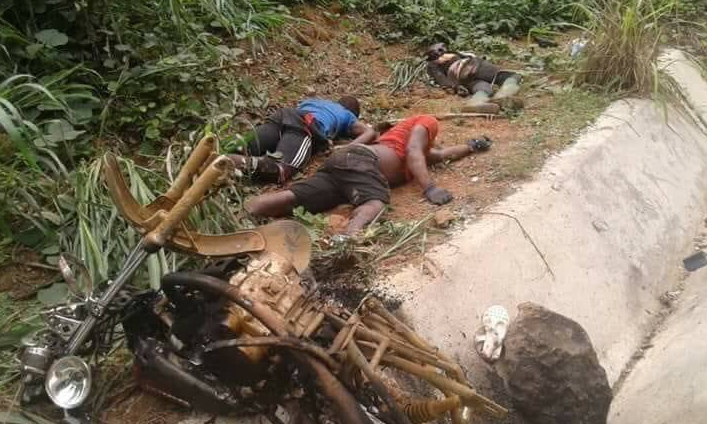
Cameroon is undergoing a crisis that has its roots in the imperialist domination and carving up of the country. The anglophone and francophone divisions date back to British and French occupations, which took over from German colonisation. The two imperialist powers divided Cameroon into separate spheres of influence that were later formalised by the League of Nations: the forerunner to the UN. The much-larger French colony was eventually granted independence in 1960, followed a year later by the British colony also gaining independence. Some of the anglophone areas chose to join newly-formed Nigeria, while others remained part of the Federation of Cameroon. In this article, we will situate the present situation within its historical context, and explain how the bloody hand of capitalist imperialism set the current turmoil in motion.
The situation today
Violent skirmishes have become commonplace in anglophone Cameroon. A typical clash took place on 14 September at 9pm, at a roadside checkpoint on the outskirts of Bamenda: the capital of the northwest region and home to many of the separatist fighters embroiled in the ongoing civil war. A storm was raging, and the thunder was punctuated by machine gun fire, exchanged between anglophone separatist fighters and a gendarmerie brigade. When the French-speaking officer called to cease fire, six separatist fighters’ bodies were strewn across the pothole-laden road. This is but one example of the daily fighting between English-speaking rebels and the francophone security forces loyal to the government of President Biya in the Cameroonian capital, Yaoundé.
The re-election of Biya for another seven years in power is a foregone conclusion (although the official count might not be announced for weeks after the polls opened on 7 October). Nevertheless, the government engaged in a renewed crackdown on separatists to try and reinstate law and order in the anglophone regions of Cameroon, so the vote could take place. It was always a fanciful idea that the military would be able to sufficiently quell the separatists to allow even a semblance of an election to occur in these regions, as the civil war is currently at fever pitch. Predictably, the turnout in these regions was extremely low: less than 5 percent, compared to 55 percent for francophone Cameroon.
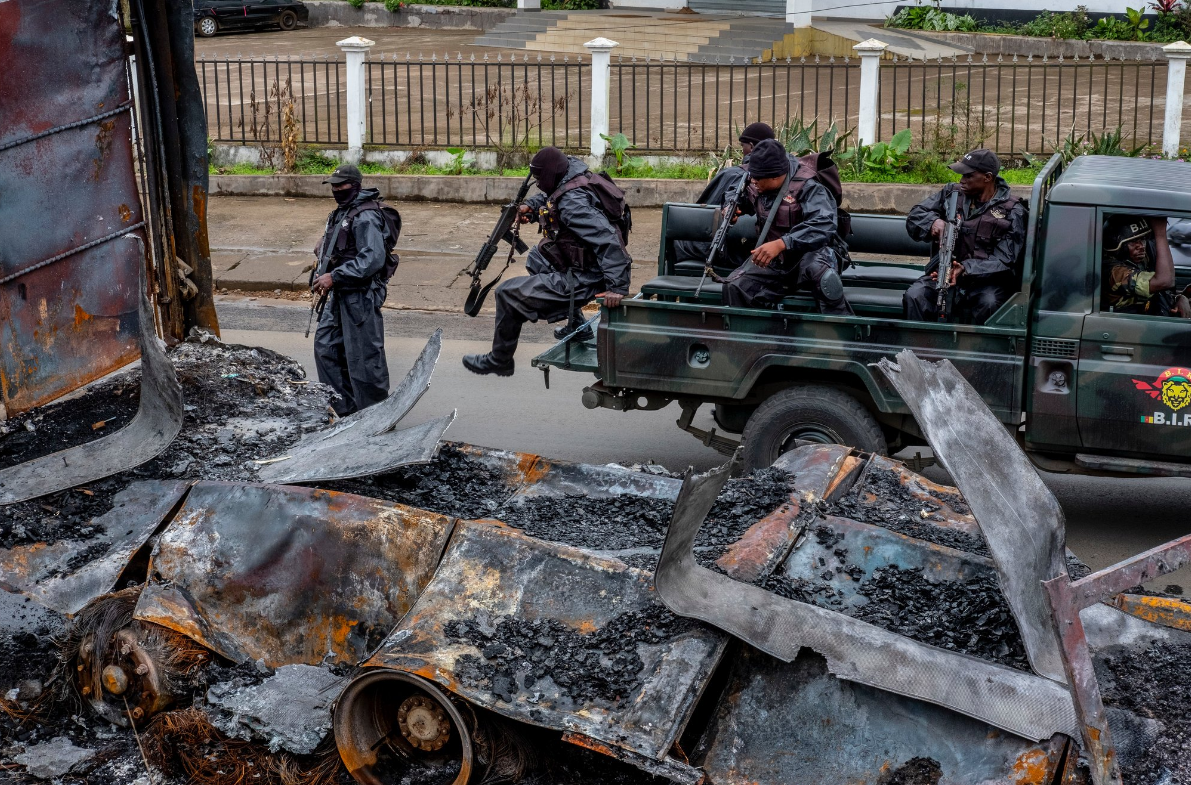
Separatists have escalated their actions in recent years, from demonstrations and strikes for language recognition, to organising the Ambazonian Defence Force in the hope of making the region ungovernable so that they will be able to create a new state for English-speakers. There is a deep-seated hatred towards the presidency of Biya from those fighting for the establishment of Ambazonia, as anglophones have faced discrimination for decades, coupled with the pillaging of natural resources from their homes. Oil was discovered in the English-speaking regions in 1970, but the main beneficiaries have been the foreign companies granted rights for extraction, and the Biya government itself, which has reaped the spoils while systematically underfunding the anglophone areas of Cameroon.
The spark for the current situation can be traced to late 2016, when English-speaking teachers were ordered to teach in French-speaking regions and French-speaking teachers were moved in to replace them, meaning learning was forcibly conducted in French. Courts were also ordered to conduct their proceedings solely in French, meaning that English-speaking lawyers could no longer represent their clients, and defendants in the anglophone population were unable to understand what was happening to them in court.
This provocation led to the teachers and lawyers going on strike. Tens of thousands of people took to the streets demanding full recognition of their language rights. Security forces tried to suppress the situation by firing into a demonstration, killing 17. These murders hardened many of the anglophone population into supporting independence for Ambazonia and also had the effect of creating armed groups, which responded in kind by killing soldiers, police officers, and people they believed to be collaborating with the authorities.
The government in Yaoundé says more than 120 of their security forces have been killed in these actions, while the United Nations says the fighting has caused 160,000 people to flee their homes and 34,000 more to seek sanctuary in neighbouring Nigeria. The number of civilian deaths cannot be ascertained due to the continued fighting in the region.
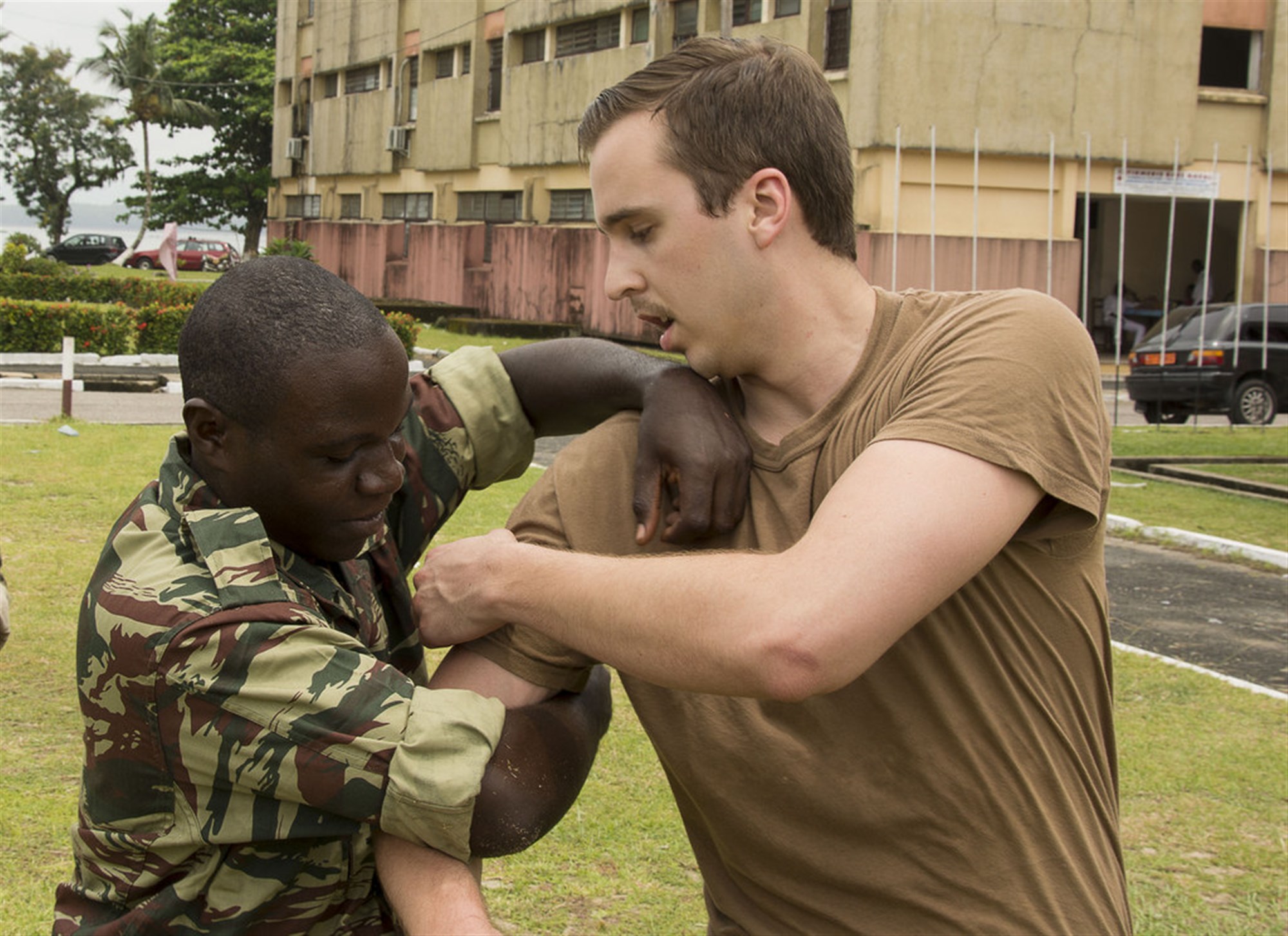 The Rapid Intervention Battalion (BIR), which reports directly to President Biya, is trained in combat and torture techniques by US, French, Israeli and British military personnel / Image: US Military
The Rapid Intervention Battalion (BIR), which reports directly to President Biya, is trained in combat and torture techniques by US, French, Israeli and British military personnel / Image: US Military
Government forces have been accused of committing genocide against the anglophone population by international organisations such as Amnesty International. Villages in anglophone areas have been systematically targeted and razed to the ground. The internet has been suspended, curfews instigated, and new anti-terrorism legislation has been passed that has placed hundreds of people on death row for organising protests against the government. President Biya has declared war on all separatists.
The elite wing of the military, the Rapid Intervention Battalion (BIR), which reports directly to President Biya and is trained by US, French, Israeli and British military personnel, has been videoed executing unarmed women and their toddlers, faced corroborated reports of shooting into peaceful demonstrations and also stands accused of implementing torture techniques (learned from the Americans) on the separatists. The actions of the government have thrown petrol on a situation that has its roots in the imperialist carving up of Africa and the reunification of Cameroon in 1961.
German imperialism and partition
Today’s Republic of Cameroon was created out of territory that was dominated by German imperialism from 1884 to 1916, called Kamerun. The Germans, through companies mainly based in Hamburg and Bremen, conducted plantation activities during the European imperialists’ “Scramble for Africa” and subjugated the local populations, who spoke a wide range of local languages and dialects. Unsurprisingly, the German colonisation of Cameroon did not succeed in uniting the populations in a common sense of nationhood but did leave a legacy of a common name for the region, which at a later date was utilised to defend imperialist interests.
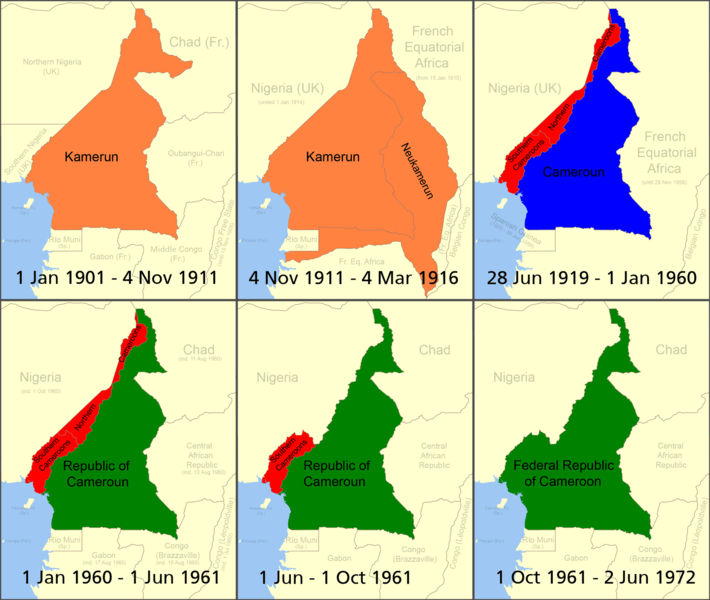
At the end of the First World War, British and French troops, with some help from Belgian forces, managed to expel the German military from Kamerun. The 1919 London Declaration, which was decided solely between France and Britain, granted one-fifth of the former German colony to Britain and the remainder to France. The League of Nations accepted the partition of Kamerun in 1922. This is what created the future anglophone minority in Cameroon and a francophone majority in the rest of the country. London chose to split her new war spoils and formed a Northern zone, where Islam was practiced by large numbers of people, and a Southern zone where Christianity was more widely followed. Both were to be administered by the neighbouring British colony of Nigeria.
After the Second World War, Britain and France were drastically weakened as world powers and the US emerged as the leader of the so-called “free world”. Through the United Nations, and a recognition on the part of the old imperialist powers that they could no longer govern in the same ways as before, the US pushed for the Cameroonian mandates granted by the League of Nations to be transferred to UN Trusteeships with the expressed understanding they would be granted independence at a yet-undecided future date. At this time, the call for reunification of Cameroon had very little support among the local populations, split between the French and British-controlled areas. But a movement around this demand would materialise; supported and pushed, in the first instance, by Cameroon’s western-educated elites who saw opportunities to further their own prestige and political goals.
Cynical maneuverings
It was this elite – that had previously adapted very easily to the German, and then French or British, colonial rule – that saw the United Nations as a vehicle for promoting their project. One of these men was Paul Soppo Priso: Cameroon’s first native millionaire. Soppo Priso was born to one of the most important families in Douala and his schooling led him to train in topography: the study of mapping and surveying land.
After the fall of Kamerun from German control, and its consolidation into French and British hands, many German families decided to sell their assets and move back to the Motherland. Soppo Priso put his training to good use, managing to purchase a construction company and some land at a very cheap rate from a fleeing German family. This would later be the basis of Soppo Priso’s wealth: the extraction of raw materials, predominantly stone, to be sold to foreign companies. During the 1930s, Soppo Priso would develop extremely close relationships with the French colonial government and as a result held two ministerial positions in the colonial regime. The French then sponsored Soppo Priso to form the Jeunesse Camerounaise Française (JEUCAFRA). JEUCAFRA’s main political aim was to undercut Hitler’s intentions of recovering Germany’s lost colonial possessions.
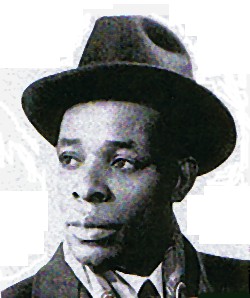 Soppo Priso: Cameroon's first native millionaire / Image: public domain
Soppo Priso: Cameroon's first native millionaire / Image: public domain
JEUCAFRA had success in winning support from Cameroon’s business elite, who had benefited from the German exodus and from a general anti-German sentiment. Their first demonstration was held in January 1939 in front of the office of the High Commissioner of the French Republic in Cameroon and was attended by over 20,000 people. JEUCAFRA was wound up after serving its purpose at the end of the Second World War, but Soppo Priso now had grander political intentions and launched his second political adventure, Rassemblement Camerounais (RACAM).
Soppo Priso ensured that RACAM made reunification a cornerstone of its politics. This policy was cynically developed to boost Soppo Priso politically. He had seen, at the United Nations, how the idea of unification of the Ewe people in Tongoland – whose territory was split between Britain and France after the Germans lost control in 1916 – had garnered support. As a result, Britain and France, to undercut public support for unification of the Ewe, were forced to grant greater political autonomy to Tongoland, which was seized upon by the native Togolese politicians of the same ilk as Soppo Priso. Thus, Soppo Priso believed he could use the United Nations and the idea of reunification to further himself and the class which he represented.
The UPC
Outside the country, RACAM had a focus on moderation and not upsetting their French masters unduly. This would not be a movement fit for young radicals, who were influenced by Marxist ideas and who had links with the French CGT trade union. On 10 April 1948, a small grouping of radical nationalists met in a bar in Douala Bassa quarter and formed the Unions des Populations du Cameroun (UPC). The UPC advocated immediate reunification and had a focus on garnering local support for their cause.
At first, the UPC’s work was confined to the wealthier strata and organised workers within the French provinces of Cameroon, but quickly spread to British-controlled Cameroon through francophone émigrés working on the plantations there, who had fled the harshness and oppressiveness of the French colonial system. Over 17,000 such workers were living in the Southwest British province of Cameroon in 1950.
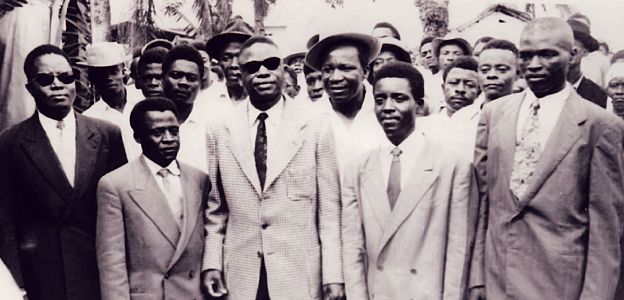 In 1948, radical nationalists formed the Unions des Populations du Cameroun (UPC), which had links with the French CGT union / Image: public domain
In 1948, radical nationalists formed the Unions des Populations du Cameroun (UPC), which had links with the French CGT union / Image: public domain
It was these workers on the plantations who initially formed the real basis of support for unification of Cameroon. It was a logical way for them to throw off the yoke of French imperialism and the stigmatisation they now faced from the British authorities, while linking back to their kin still in the French-controlled Cameroon.
The idea of unification also found fertile ground among sections of anglophone workers, who for a long time had suspected that Nigeria was being favoured for funding in the region, given that Britain was using the nation to govern their portion of Cameroon. This sentiment was seized upon by various new political formations, most of which mixed anti-francophone sentiments with a demand for an independent province, separate from British Nigeria and French Cameroon.
The UPC was the only organisation with unification politics that managed to span the anglo-francophone divide with some success. By 1950 they were considered the largest political grouping in the whole of Cameroon, although in reality they were still limited mainly to the southwest of the country, particularly in areas where the ethnic populations of Bassa and Bamileke peoples were most prominent.
The United Nations
Although the UPC had a clear focus on building locally they also had illusions that they could succeed in appealing to the United Nations to force France and Britain to respect the wording of the Trusteeships granted to them. As Article 76 of the Trusteeships Charter said:
“The basic objectives of the Trusteeship system, in accordance with the Purposes of the United Nations laid down in Article 1 of the present Charter shall be:
“A) to promote international peace and security;
“B) to promote the political, economic, social, and educational advancement of the inhabitants of the Trust Territories and their progressive development toward self-government or independence as may be appropriate to the particular circumstances of each territory and its peoples and the freely expressed wishes of the people concerned.”
In 1952, the UPC leadership under Ruben Um Nyobe asked if they could present their case as an oral petition to the General Assembly of the UN. Um Nyobe believed that he could make a compelling case to the General Assembly that the British and French troops were occupying forces, and in order to promote the political, economic, social, and educational advancement of the peoples of Cameroon, unification must take place against the whims of imperialism.
Um Nyobe tried but his words were greeted with no support. The UPC would continue, under Um Nyobe’s leadership to try to convince the United Nations of this argument, but to no avail. A tactic was developed by the UPC to send petition after petition to the General Assembly asking for them to push for unification of the region. Over the 1950s, hundreds of petitions – each with tens of thousands of names – were sent from the UPC to the General Assembly.
The problem for the UPC was that their argument, although not fundamentally incorrect (that is, the imperialist looting of Africa was holding back the development of its people) ignored the fact that the United Nations does not work as a debating club, where argument and debate fundamentally affect their course of action. The UN is governed by the main imperialist powers and can only act when these powers agree. Sadly, the fledgling UPC failed to understand this and spent untold time gathering signatures and sending petitions and letters to the UN.
Banning the UPC, and the Hidden War
The activities of the UPC and their politics of anti-colonialism, while building local meetings and branches, made it impossible for them to avoid the ire of the authorities, especially at first in the French-controlled land. The UPC was banned in French-controlled Cameroon in 1955, following riots in major cities when they had a membership of over 100,000 and 450 branches. The UPC was driven underground and their headquarters and buildings burned to the ground. Many of the leadership fled to the British-controlled regions, where they were not persecuted to the same degree.
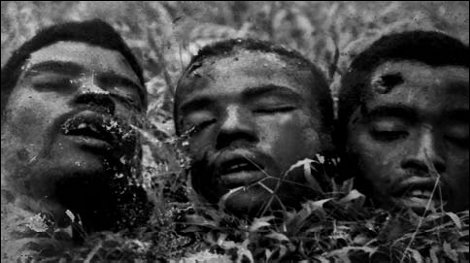 UPC leaders were systematically targeted and decapitated by French troops. The survivors fled or were driven underground / Image: public domain
UPC leaders were systematically targeted and decapitated by French troops. The survivors fled or were driven underground / Image: public domain
The Catholic Church and traditional tribal leaders also declared war on the UPC – and their influence spanned beyond the borders of the French-controlled territories. The Church accused anyone associated with the UPC of being violent communists who were in a conspiracy to destroy their institution. The old tribal rulers, whose authority was based on a mix of ethnic support and old relationships (and whom the UPC labelled “parasitic, feudal barons…ripe for destruction”) called for those loyal to their tribes to run the UPC into the ground. These calls united the most backward layers in Cameroonian society against the UPC.
The quelling of the UPC was brutal. It is estimated that it resulted in over 75,000 civilian deaths. Most of these people hailed from the Bamileke ethnic group and that is why this ruthless massacre is known as either the Bamileke War or the Hidden War due to the limited international attention to the atrocity.
The number of deaths is hard to estimate, yet General Max Briand, the commander of all French military forces in Cameroon, gave a report that an estimated 20,000 “terrorists” were killed in 1960 alone. The French, now backed by the British authorities, also instigated a policy to decapitate the leadership of the UPC, which would, in their view, put an end to the “communist plague” gripping the country. In September 1958, French troops tracked down Um Nyobe and succeeded in assassinating him in his own home, while his mother watched.
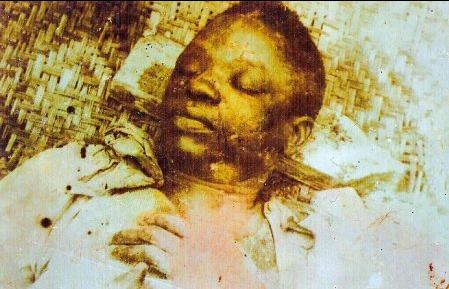 In 1958, UPC leader Um Nyobe was assassinated by French troops in his own home, while his mother watched / Image: public domain
In 1958, UPC leader Um Nyobe was assassinated by French troops in his own home, while his mother watched / Image: public domain
The UPC had been successfully smashed by the full force of the state. The membership had been killed, imprisoned or driven underground. The leaders of the organisation were murdered or in exile. Also, those leaders who did manage to seek refuge in neighbouring countries were split between the support of either the Moscow or Chinese leaderships in the ongoing Sino-Soviet split. Devoid of any relationships with the workers’ and peasants’ movements in Cameroon, the shell of the UPC quickly deteriorated further and eventually moved away from any kind of socialist leanings; ultimately accepting capitalism and focusing solely on national liberation through the armed struggle. The UPC as a progressive political force was now dead.
Towards independence and reunification
RACAM under Soppo Priso was forced to wind up in 1947 under pressure from the French authorities, as they believed at this time that any unification demands would undermine their continued control in the region. Soppo Priso would go from millionaire to billionaire by successfully enriching himself under the new leadership of Ahmadou Ahidjo in French-controlled Cameroon.
Ahidjo’s rise to power coincided with a change in tactics on the part of the French authorities. The French ruling class was facing a protracted war not only in Cameroon but also on a larger scale in Algeria, France’s most prized colony. The Algerian crisis of 1958 brought de Gaulle to power and his government prioritised maintaining Algeria at the expense of French-controlled West Africa.
From 1958 to 1960, all 12 of their colonies in West Africa were granted independence: an independence that would see the main leaders handpicked in the first instance by the French authorities, as those political groups opposed to French interference were outlawed as terrorist groups. The doctrine of the French at this stage was to find a small but influential elite – that was sufficiently satisfied with the status quo to refrain from anti-French sentiment – to take up leadership positions post-independence.
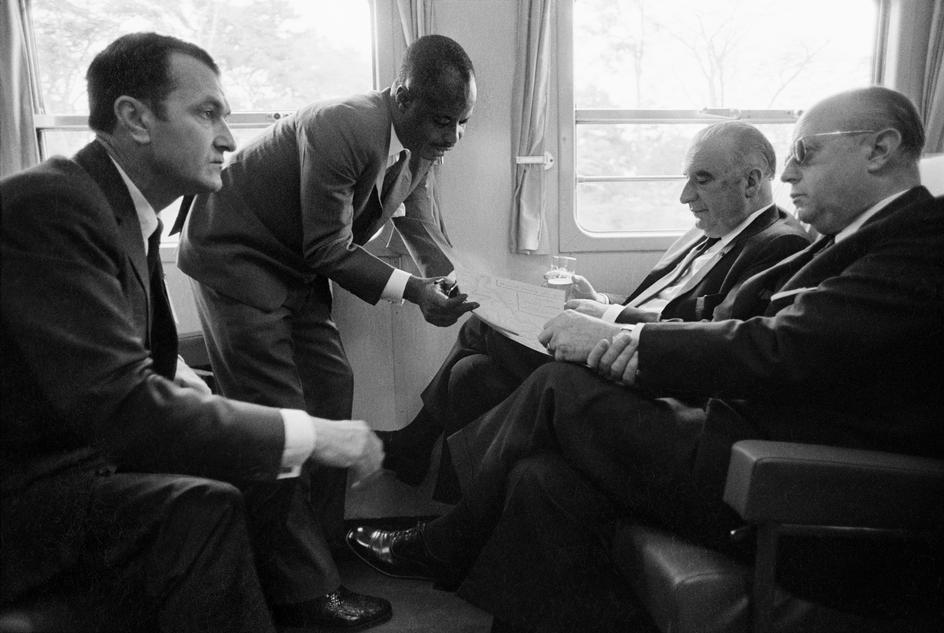 Independence for French-controlled was granted under Ahmadou Ahidjo's leadership on the condition that the republic remain subordinate to France / Image: public domain
Independence for French-controlled was granted under Ahmadou Ahidjo's leadership on the condition that the republic remain subordinate to France / Image: public domain
Ahidjo was no different in this regard and formed closer links with France through the French Union. With Ahidjo in place and the decision on independence already made by the French authorities, the UN sent a ‘fact-finding mission’ in 1958 to see if Cameroon should move from Trusteeship to independence. The fact-finding mission came back, agreeing with the new French position, that independence should be granted, with Ahidjo’s government to rule the new territory.
When independence was granted in 1960, Ahidjo declared that Cameroon would be a liberal, capitalist state that would depend upon the goodwill and aid of the French. Ahidjo was indifferent towards unification of the British-controlled area with the newly formed republic. He simply stated that he would leave it to the people of the region to decide their future and that he would not stand in their way if they chose to join.
During this time, the British held elections in the areas under their control. A party called the Kamerun National Democratic Party (KNDP) won the elections in the Christian southern provinces by alluding to unification with the rest of Cameroon. The idea of unification, built up by the UPC, still gripped the minds of the remaining émigré workers and radical students, although this was still a minority position in the region. The majority view of the people, at this stage, was for independence from Nigeria and Cameroon and for the setting up of their own independent state.
British imperialism feared that allowing a newly independent state to be set up could become a source of instability and thus affect economic relations and, most importantly, their own looting in the region. Therefore, through their power at the UN, the British government pushed for an upcoming referendum to decide the future of the region, on a simple choice of either union with Nigeria or with Cameroon.
The British authorities achieved such a position at the UN – of ignoring the peoples’ choice of independence – by a dual tactic of arguing that such a state would be unstable and, by extension, could fall prey to communism, and that the people of these regions couldn’t comprehend a referendum with more than two options! When the selective referendum was held, the northern region decided to join Nigeria and the southern provinces voted to join Cameroon.
The dictatorships of Ahidjo to Biya
The war against the UPC was still raging when unification took place in 1961. Ahidjo used this as justification to increase his authoritarian rule and instigated a repressive dictatorship backed by French troops. In 1966, he managed to achieve one of his major political goals and dissolved all other political parties, forming a one-party state that he called a “ruling democracy”. The limited press freedoms and freedom of association that existed before independence were now completely removed. Ahidjo then attempted to project himself as father of the nation and plastered his image on billboards entering and leaving every town. To question Ahidjo’s authority in public was now considered suicidal, as the last of the dwindling UPC militants were drowned in blood.
In 1972, president Ahidjo, after proclaiming an end to the UPC, centralised the little remaining political structures outside of his direct control and destroyed any federal structures that still existed for the provinces. This was achieved through a sham constitutional referendum with a turnout reported to be 99.8 percent, with 99.9 percent of people supposedly voting in favour of Ahidjo’s new powers. This further realignment of political power saw no serious condemnation from France, Britain or the UN.
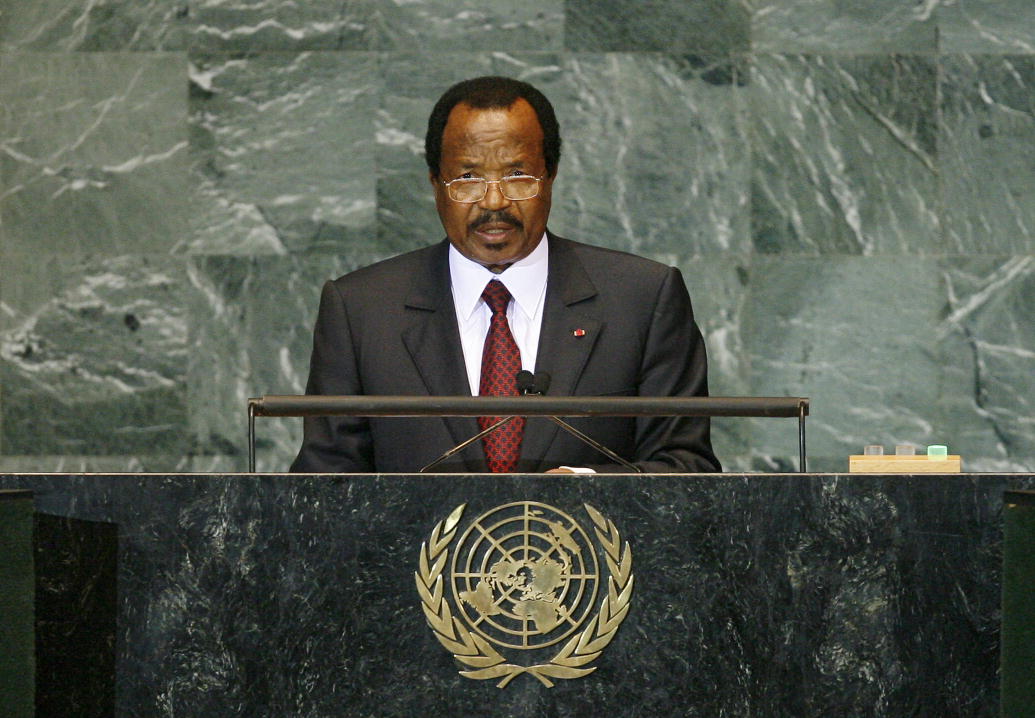 President Biya’s continued 36-year rule is characterised by brutal repression of anyone who opposes him, and especially the English-speaking peoples of the former British colony / Image: Flickr, UN
President Biya’s continued 36-year rule is characterised by brutal repression of anyone who opposes him, and especially the English-speaking peoples of the former British colony / Image: Flickr, UN
From the period of 1960 to 1982 Ahidjo ‘won’ five elections under the “ruling democracy” system, with no less than 100 percent of the vote each time and a reported turnout of at least 99 percent. In 1982, with Ahidjo reaching his 58th birthday and 22nd year in power, the situation within his own party was growing increasingly fractious and French imperialism was also becoming concerned that Ahidjo was mounting a move to break with them. Thus, in unclear circumstances, Ahidjo resigned (amidst reports of bad health) and President Biya replaced him.
The new president didn’t waste time in consolidating the existing power structure in his own image. Images of Ahidjo were removed and replaced with those of Biya and when there was an apparent coup attempt against Biya in 1984 the finger was pointed solely at Ahidjo. Ahidjo was then forced to flee the country and was consequently sentenced to death by the new regime in his absence for allegedly trying to overthrow the ruling democracy – that he had established to begin with!
President Biya at first promised increased freedoms, yet what came to pass was the exact opposite. He moved to rename the country from United Republic of Cameroon to just the Republic of Cameroon – a name that francophone Cameroon had before the 1961 unification. This move angered the peoples in the anglophone regions and marked a furthering of direct discriminatory policies and a process of forced assimilation of English speakers in the country.
Trapped between two devils
President Biya’s continued 36-year rule is characterised by brutal repression of anyone who opposes him, and especially the peoples of the former British colony. Although there was an opening up of limited freedoms of the press and a renewal of opposition parties in 1991, each subsequent election has been clearly fraudulent in Biya’s favour – including the present one, which has seen Biya leverage the entirety of the state against the opposition. Such is his confidence of victory, he has barely bothered to campaign, having organised only one rally, in the country's north region.
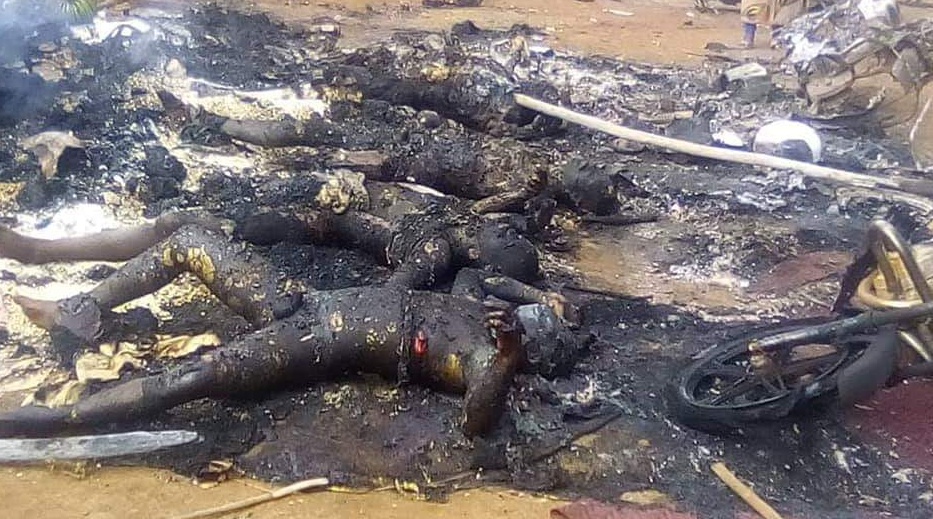
This is the backdrop to the ongoing fighting today in Cameroon. Zanda Carol, from Buea in English-speaking Cameroon, said his city was a ghost town on election day. Soldiers patrolled the streets, while armed insurgents declared and violently enforced a ban on voting in what they called an illegal poll. “We are between two devils,” Carol said.
France and Britain have supported, and continue to support, the dictatorships of first Ahidjo and then Biya. The working peoples and peasants of Cameroon, and Africa more broadly, have been subjugated to the will of imperialism, aided at times through mechanisms of the United Nations, to continue their looting of the continent. What is needed is to renew struggle based on the best traditions of the UPC and fight for true international socialism, which can unite the working people and peasants of Western Africa under the banner of genuine anti-imperialist struggle. This can only be achieved by expropriating the multinational corporations that are sucking the blood out of this potentially rich continent, and by building a socialist federation throughout the whole region.

